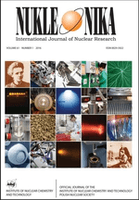
NUKLEONIKA
metrics 2024
Innovating Tomorrow's Energy Solutions
Introduction
NUKLEONIKA, published by SCIENDO, is a leading open access journal that has been serving the scientific community since its establishment in 1968. Focused on the domains of Nuclear and High Energy Physics, Condensed Matter Physics, and Nuclear Energy and Engineering, this journal provides a platform for innovative research and technological advancements in a variety of interdisciplinary fields. With an impressive history of publications and a current Q3 ranking in several categories, including Safety, Risk, Reliability and Quality and Waste Management and Disposal, NUKLEONIKA is recognized for its significant contributions to scientific discourse. Open access since 2014, the journal ensures that all research outputs are freely available, facilitating broad dissemination and accessibility for researchers, professionals, and students alike. Located in the heart of Warsaw, Poland, NUKLEONIKA aims to inspire collaborative efforts and foster a deeper understanding of complex physical phenomena and their practical implications.
Metrics 2024
 0.25
0.25 0.70
0.70 0.90
0.90 26
26Metrics History
Rank 2024
Scopus
IF (Web Of Science)
JCI (Web Of Science)
Quartile History
Similar Journals
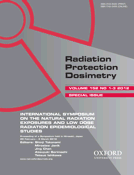
RADIATION PROTECTION DOSIMETRY
Advancing knowledge in radiation safety and dosimetry.RADIATION PROTECTION DOSIMETRY is a vital academic journal dedicated to the field of radiation protection, published by Oxford University Press. With an ISSN of 0144-8420 and an E-ISSN of 1742-3406, this journal serves as a platform for groundbreaking research and developments in dosimetry, health physics, and radiation safety spanning over four decades since its inception in 1981. Recognized with a Q3 ranking in multiple categories including Medicine (miscellaneous) and Public Health, this journal plays a key role in disseminating important findings that inform policy, enhance practice, and promote the protection of both individuals and the environment from radiation hazards. While currently not available as Open Access, the journal's curated content is essential for researchers, professionals, and students dedicated to advancing knowledge in radiation protection and related areas. Interested readers will find the latest research trends, case studies, and reviews invaluable for their work and studies within this multidisciplinary domain.
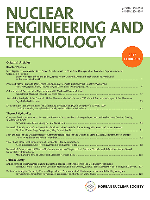
Nuclear Engineering and Technology
Connecting Scholars for a Sustainable Nuclear FutureNuclear Engineering and Technology, published by the Korean Nuclear Society, is a premier Open Access journal dedicated to the rapidly evolving fields of nuclear energy and engineering. Established as a significant platform for scholarly communication since 2008, this journal has consistently anchored itself in the academic community, achieving a Q2 ranking in its category as of 2023, reflecting its influence and quality within the domain of Nuclear Energy and Engineering. With an impressive Scopus ranking of #15 out of 77, positioning it in the 81st percentile, the journal publishes cutting-edge research that addresses both fundamental and applied aspects of nuclear technology. Nuclear Engineering and Technology embraces an open access model since 2013, ensuring that valuable research is accessible to a global audience, thereby enhancing collaboration among researchers, professionals, and students passionate about advancing nuclear technology. The journal serves as an essential resource for those aiming to innovate and push the boundaries of knowledge in nuclear sciences.
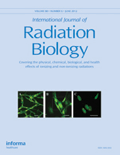
INTERNATIONAL JOURNAL OF RADIATION BIOLOGY
Shaping the Future of Radiological PracticesINTERNATIONAL JOURNAL OF RADIATION BIOLOGY, published by Taylor & Francis Ltd, has established itself as a premier forum for the dissemination of innovative research related to radiation biology, covering emerging topics that are crucial within the fields of radiology, nuclear medicine, and ultrasound technology. With an ISSN of 0955-3002 and an E-ISSN of 1362-3095, this journal spans over six decades, from its inception in 1959 to 2024, reflecting a rich history of scholarly contribution and a dynamic approach to addressing current challenges in the discipline. Its reputation is highlighted by its Q2 rankings in both Radiology, Nuclear Medicine and Imaging and Radiological and Ultrasound Technology for 2023, underscoring its relevance in a competitive academic landscape, with Scopus rankings placing it in the top tier of its category. While operating under a traditional access model, the journal aims to connect researchers, professionals, and students, facilitating the advancement of knowledge and fostering a deeper understanding of the impact of radiation in various medical applications. The journal plays an essential role in shaping future research directions and enhancing clinical practices globally.
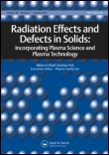
Radiation Effects and Defects in Solids
Exploring the Impact of Radiation on Solid MaterialsRadiation Effects and Defects in Solids is a prestigious academic journal published by TAYLOR & FRANCIS LTD that has been at the forefront of research related to the impacts of radiation on various solid materials since its inception in 1989. With an ISSN of 1042-0150 and an E-ISSN of 1029-4953, this journal serves as an essential resource for researchers and professionals in the fields of Condensed Matter Physics, Materials Science, and Nuclear and High Energy Physics. Despite its current categorization in the Q4 quartile across these disciplines, Radiation Effects and Defects in Solids remains critical for advancing knowledge of material responses to radiation, which is vital for applications in nuclear energy, space exploration, and radiation therapy. The journal publishes original research articles, reviews, and letters that provide insights into material properties, radiation dosimetry, and defect structures, fostering collaboration and innovation within the scientific community. As the field evolves, Radiation Effects and Defects in Solids continues to play a significant role in disseminating valuable research findings and keeping pace with emerging trends in materials science and radiation physics.

JOURNAL OF SYNCHROTRON RADIATION
Illuminating the Path of Open Access ResearchJOURNAL OF SYNCHROTRON RADIATION, an esteemed publication by the International Union of Crystallography, is a leading journal in the fields of Instrumentation, Nuclear and High Energy Physics, and Radiation. With an impressive impact factor and categorized as a Q1 journal across multiple disciplines in 2023, it demonstrates a commitment to advancing knowledge and applications in synchrotron radiation science. The journal has embraced an Open Access model since 2022, providing unrestricted access to cutting-edge research for a global audience. Published bi-monthly, JOURNAL OF SYNCHROTRON RADIATION serves as a vital platform for researchers, professionals, and students seeking to engage with the latest findings, methodologies, and innovations in synchrotron techniques and technologies. With its rich history from 1996 to 2024, it is recognized as a key resource for those aiming to push the boundaries of material science, structural biology, and beyond.

International Journal of Radiation Research
Empowering Discoveries in Radiation TechnologyThe International Journal of Radiation Research, published by the IJRR-IRANIAN JOURNAL RADIATION RES, serves as a critical platform for researchers and professionals in the fields of radiology, nuclear medicine, and imaging technology. Since its inception in 2003, this peer-reviewed, open-access journal has focused on disseminating significant findings and advancements, contributing to the global discourse on radiation research. With an ISSN of 2322-3243, the journal offers valuable insights into emerging technologies and methodologies, maintaining a commitment to enhancing the understanding and application of radiation in medical science. Although currently positioned in the Q4 category across its scopes, the journal strives to elevate its impact by promoting high-quality research and innovative practices. The journal is accessible to a wide audience and encourages submissions from scholars worldwide, directly supporting the advancement of knowledge in radiological and ultrasound technology. For those seeking to explore and contribute to this dynamic field, the International Journal of Radiation Research represents an invaluable resource.
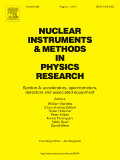
NUCLEAR INSTRUMENTS & METHODS IN PHYSICS RESEARCH SECTION A-ACCELERATORS SPECTROMETERS DETECTORS AND ASSOCIATED EQUIPMENT
Advancing the frontiers of nuclear instrumentation.NUCLEAR INSTRUMENTS & METHODS IN PHYSICS RESEARCH SECTION A is a leading journal published by Elsevier, dedicated to the advancements in accelerators, spectrometers, detectors, and associated equipment relevant to the fields of nuclear and high energy physics. With its ISSN 0168-9002 and E-ISSN 1872-9576, this journal fosters knowledge sharing among physicists and researchers globally, providing a critical platform for both theoretical and experimental studies. Currently ranked in the Q2 quartile for both Instrumentation and Nuclear and High Energy Physics, the journal maintains a robust position in the competitive Scopus rankings, with noteworthy placements that underline its scholarly impact. As of 2023, it occupies the 38th rank in Nuclear and High Energy Physics and the 79th in Instrumentation, illustrating its relevance in the scientific community. Covering research spanning from its inception in 1983 to the projected completion in 2024, the journal caters to a diverse audience of researchers, professionals, and students eager to stay abreast of the latest innovations and techniques in the realm of nuclear instrumentation. Although it primarily operates under subscription-based access, it is instrumental in disseminating pivotal findings and experimental methodologies that drive progress in the scientific community.

Radiation Detection Technology and Methods
Pioneering Research for Enhanced Energy SecurityRadiation Detection Technology and Methods is a prominent academic journal published by Springer Singapore Pte Ltd, dedicated to advancing the field of nuclear and high-energy physics, as well as nuclear energy and engineering. Established in 2017, this journal provides a platform for the dissemination of pioneering research and innovative methodologies in radiation detection technology. As of 2023, it holds a commendable Q2 ranking in both the categories of Nuclear and High Energy Physics and Nuclear Energy and Engineering, underscoring its significance in fostering scholarly discourse within these vital fields. With ISSN 2509-9930 and E-ISSN 2509-9949, the journal aims to cater to a diverse audience of researchers, professionals, and students, emphasizing open access to knowledge. The journal's contributions are particularly crucial for those engaged in the development of safer and more efficient radiation detection techniques, ultimately bridging the gap between theory and practical applications in energy security and health physics. For researchers seeking a dedicated outlet for their work, Radiation Detection Technology and Methods represents an invaluable resource and an opportunity to influence the future of radiation science.
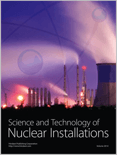
Science and Technology of Nuclear Installations
Empowering Research in Nuclear TechnologyScience and Technology of Nuclear Installations, published by HINDAWI LTD, is an esteemed scholarly journal specializing in the dynamic field of nuclear energy and engineering, with an ISSN of 1687-6075 and an E-ISSN of 1687-6083. Since transitioning to an Open Access model in 2007, the journal has significantly contributed to the dissemination of innovative research and practical applications in nuclear technology, attracting a global audience from both academia and industry. Based in Egypt, this prominent journal serves as a vital platform for researchers seeking to explore advanced methodologies, cutting-edge technologies, and the sustainable development of nuclear installations. Achieving a commendable Q2 category ranking in Nuclear Energy and Engineering and positioning at #35/77 in Scopus rankings (55th percentile) underscores its influential presence within the scientific community. With a publication horizon extending from 2008 to 2024, the journal remains committed to fostering collaboration and innovation in nuclear science, making it an invaluable resource for researchers, professionals, and students alike.
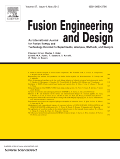
FUSION ENGINEERING AND DESIGN
Driving High-Impact Discoveries in Energy Solutions.FUSION ENGINEERING AND DESIGN is a premier scientific journal published by Elsevier Science SA, dedicated to advancing the field of fusion engineering, materials science, and related disciplines. Established in 1985 and running through 2024, this journal features cutting-edge research that spans multiple categories, including Civil and Structural Engineering, Mechanical Engineering, Materials Science, and Nuclear Energy and Engineering, holding a notable Q2 quartile ranking in each field as of 2023. Catering to a global audience of researchers and professionals, FUSION ENGINEERING AND DESIGN emphasizes the importance of interdisciplinary collaboration and innovative technology in tackling the complex challenges associated with fusion energy. Although it does not offer Open Access, the journal remains an essential resource for those seeking to stay abreast of developments that could shape the future of energy solutions and engineering methodologies. With a dedicated editorial board and a commitment to high-impact publication, this journal serves as a vital platform for disseminating transformative ideas and driving forward the scientific dialogue in fusion engineering.